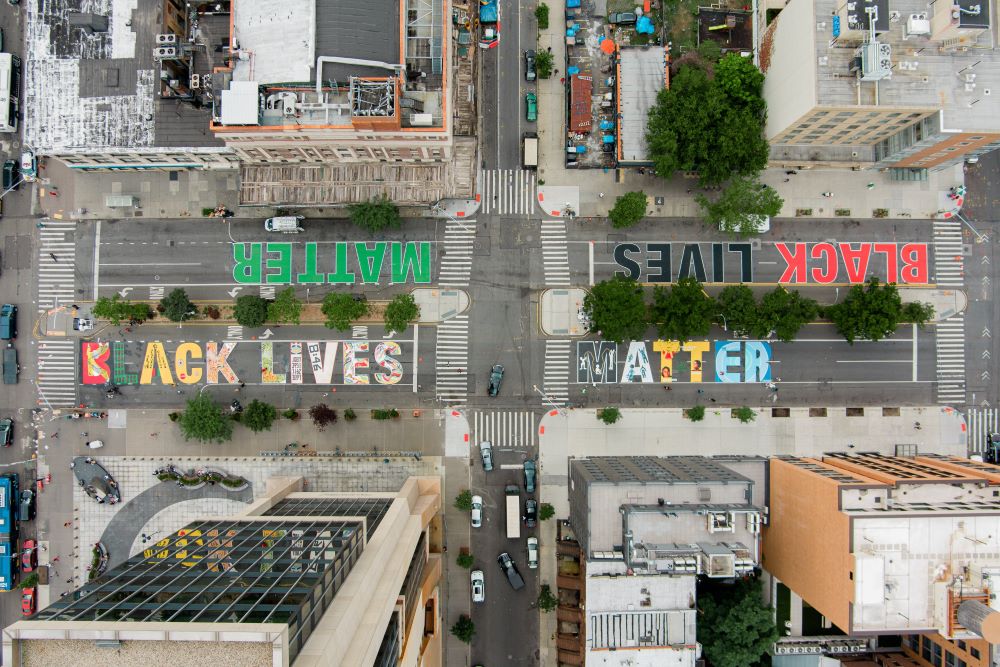
An aerial view of a "Black Lives Matter" mural is seen in the Harlem neighborhood of New York City on July 7, 2020. (CNS/Reuters/Alon Sicherman)
In the spring and summer of 2020, I was a Care Bear. After police officers murdered George Floyd and Breonna Taylor (who lived in my town, Louisville, Kentucky), I sought ways to use my skills and gifts to support the liberation of my Black and brown siblings from the systems that violently oppress them. I found my place as a Care Bear in the Black Lives Matter movement in Louisville. I offered physical and emotional support to protesters, organizers and medics. Our crew passed out water and snacks to protesters, provided logistical help to organizers, assisted medics and offered emotional support when requested.
Black Lives Matter organizers and activists showed me what it looks like to center the voices, bodies and lives of the most oppressed and marginalized. I witnessed and participated in a community coming together and caring for each other. Those who had been rejected, ignored and oppressed by societal systems and mindsets were creating a community where all had what they needed, felt loved, and knew their belonging. I was encouraged to practice rest as resistance and self-care as collective care. Most importantly, it became clear that despite all I was doing in the community, I must also commit to the inner work of liberation.
Through the lens of my faith, we were living out Gospel values — building the Kin-dom of God. I see Jesus' vision of the Kingdom of God as a vision of a liberated people — internally and externally. Jesus taught freedom through understanding who we are, creating communities of welcome and care, and nonviolent resistance to oppressive regimes. These mirror three avenues for social change that focus on personal transformation, building alternative communities and systems, and collective action to expose and dismantle oppressive societal systems.
Let's talk about personal transformation as an essential component of building a liberated society. The language of sacred activism has begun to help me articulate how inner transformation supports communal liberation. Sacred activism is contemplation and embodied compassion in action. How I see and understand myself, others, and the Divine affects how I move and act in the world. Sacred activism is social change rooted in a deep knowledge of the interconnectedness of all life.
Jesus taught us that we are not separate from God; we are all kin and should treat each other with care. (I also consider all elements, plants and creatures of Earth my relatives.) When we perceive that we are separate, different or better than others, it is easier to harm them. Seeking internal freedom means freeing myself from any conditioning, mindsets and actions that disconnect me from the truth of our inherent goodness and oneness. Rediscovering, remembering and reconnecting with my wholeness and the greater wholeness of life is one step toward liberation.
Part of being a religious sister means focusing on the inner life through self-exploration and connection with the Divine. This process supports the expanding of my heart and mind, the untangling of destructive thoughts and beliefs, and the remembrance of our interconnectedness. Getting to know and understand myself and letting go of identities that keep me trapped in ego is a lifelong practice. Shifting from self-criticism to acceptance and appreciation helps me honor all the ways life lives in me. I have encountered messages that judgingly tell me that focusing on myself is self-centered and selfish. This may be true. However, experience has shown me the value of balancing other-centeredness and self-centeredness.
Since we are interconnected and belong to the same community of life, everything we do affects the whole web of life. If I do not attend to my inner work, my ego can slow down the collective's work. When I mess up and miss the mark, doing the inner work allows me to remain connected to and motivated by love instead of getting caught up in an egotistical desire to appear a certain way. My lack of self-care can hurt the collective, especially if I burn out. Alternatively, as I sustain my well-being and heal, I increase my capacity to contribute to the well-being of the whole and continue my efforts to build a more just and equitable society.
Advertisement
A golden rule across many faiths is to love your neighbor as yourself. If I do not love myself, how might that affect how I love my neighbor? I have experienced that the more I offer myself acceptance, compassion and love, the more I can provide the same to those around me. The more I can experience myself as the beloved of God, the more I can see others as beloved. The more I can touch and sit with my pain, the more I can be with others in their pain. Instead of turning from another, I am more empowered to stand with them and do what I can to support them.
Another part of cultivating inner freedom is committing to the difficult, uncomfortable and scary work of facing and dismantling the ways I have internalized oppressive belief systems such as white supremacy, ableism, sexism, heteronormativity and cisnormativity (to name a few). Becoming aware of and unraveling the harmful messages and shame that distort my view of self takes humility, daily practice, patience, conscious choosing and perseverance. When I confront the privilege and oppression within me and experience the pain they cause, I am more able to see the destruction and pain these systems and mindsets cause to others. When I practice meeting this pain with compassion, I feel compelled to do whatever I can to dismantle the oppressive systems and free all from unnecessary suffering.
Sacred activism is about transforming the way I see myself and the world. It involves cultivating a vision where I no longer see enemies, but instead call all siblings. I act not because I am supposed to or because it is the right thing to do; I respond grounded in love and compassion. May we all participate in the Divine transformation of the world by devoting ourselves to cultivating the inner freedom that leads to bold, compassionate action.





